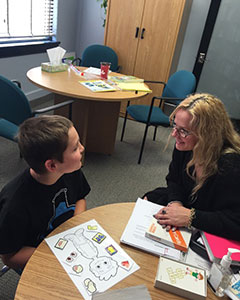
Language Delays & Disorders
As a parent or a caregiver of a child, many of us will often pay special attention to how a child communicates. They may be difficult to understand, have limited vocabulary, have difficulties in being part of a group or following directions. As early identification is key, it’s important for parents, caregivers, teachers, pediatricians, doctors and early childhood educators to identify if a child may have exceptional communication needs.
In general terms, language is the foundation for all communication whether it be shared in spoken, written or nonverbal forms. There are many different aspects to language including sound awareness and early literacy (phonology/phonological), grammar (syntax), vocabulary (semantics), social aspects (pragmatics) of communication and thinking skills (executive function).
“Language is layered from simple to complex. You have to have your basic skills before you can reason abstractly about the world around you and the people in it.” – Tammy
If a child’s ability to communicate is at a slower rate than other children at their age they may present with a language delay or disorder. Language delays and disorders can be both developmental and acquired.
By identifying these difficulties early on, speech language pathologists (SLPs) can assess and establish an intervention plan to minimize the challenges the child may have in terms of having effective communication skills.
While the issues may seem overwhelming at first, most often a qualified speech language pathologist will have great success in working with a child to improve the way in which they communicate once the problems are identified and counselling begins. Treatment often involves support from the entire family, but the SLP will guide families through recommendations and management strategies to achieve the best results possible.
